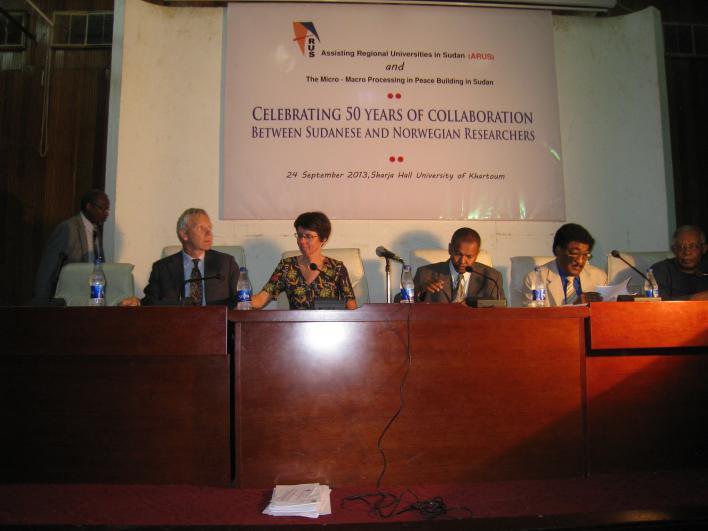UiB celebrates Sudan collaboration
UiB’s Vice-rector for international affairs, Professor Anne Christine Johannessen, praises Fredrik Barth and Gunnar Håland as the pioneers of the co-operation between UiB and the University of Khartoum.

Hovedinnhold
“Their initiative has proved itself far beyond the borders of their own academic discipline, and far beyond the borders of the University of Khartoum,” Johannessen says.
Celebrations in Khartoum
On 24 September 2013, Johannessen visited Khartoum to celebrate 50 years of collaborations between the universities and to sign a new Memorandum of Understanding (MoU) covering the next five years.
According to Johannessen, Bergen has historically been the most international of Norwegian cities and she pointed out how this has created fertile soil for UiB and its predecessor Bergen Museum to naturally engage beyond Norway’s borders.
“The Khartoum link created new patterns and modes of academic co-operation and became one of the pioneering and most influential co-operations we have had with universities abroad,” she said.
Pioneering nature
The vice-rector went on to underline the pioneering nature of these early academic collaborations. After all, UiB was only founded in 1946 and was an institution still in its youth when the Khartoum-Bergen connection was established. When a General Agreement was signed between UofK and UiB in 1983 – at 30 years yet another anniversary this year – this had a profound impact on UiB’s international relations.
“When the General Agreement was signed in 1983 it was the first of its kind for UiB, thus providing a model for a number of later agreements with universities around the world,” Johannessen said.
She pointed to some important aspects for why the collaboration was so successful, including the co-operating partners’ focus on combining education and research. And the students’ engagement was an integral part of this.
“The first doctorate of UiB’s Faculty of Social Sciences was awarded to a Sudanese,” she said referring to Professor Abdel Ghaffar Mohammed Ahmed, who was present at the celebrations.
As the collaboration grew
In the very beginning, the collaboration between the universities in Bergen and Khartoum was only in the field of anthropology. But it soon came to involve other disciplines.
By the late 1960s and early 1970s, researchers from both history and archaeology followed in the footsteps of the anthropologists. Philosophy was also involved at an early date. Soon geography, botany, dentistry, medicine, and psychology followed suit. This all lead up to the signing of the 1983 agreement.
“This was instrumental in committing resources and support to on-going research, such as the Senior Research Fellowship programme which was funded solely and entirely by UiB and which played an important role in creating and maintaining links,” Johannessen said before referring to the creation of the Centre for Development Studies. “The Khartoum link was an integral part when UiB established its first multidisciplinary research centre in 1986.”
She then highlighted the involvement of two former directors of the centre, the Chr. Michelsen Institute’s Director Gunnar M. Sørbø and UiB Professor Leif Manger, both with long-standing ties to Sudan and both present at the celebrations in Khartoum.
Bring on the young
For Johannessen the trip to Khartoum provided the new leadership of UiB with an opportunity to renew the strong ties with higher research institutions in Sudan. Not only did she sign a new MoU between UiB and the University of Khartoum. She also wanted to promote the collaboration to include a new generation of researchers and took the opportunity to present a gift to her hosts in Khartoum.
“UiB has decided to award a ‘Sudan scholarship’ to a young Sudanese researcher in the field of social anthropology, allowing the recipient to come to Bergen and stay for a period of six months doing research,” she told the attendees. “The Scholarship will be organised at the Department of Social Anthropology at the Faculty of Social Sciences.”
New momentum
At the celebrations there was also delight that the collaboration between the universities in Bergen and Khartoum has gained momentum due to two new projects that kick off now. In July the project Borderland Dynamics in East Africa was awarded NORHED status, part of a new capacity building programme from Norway’s state aid organisation NORAD. This project is a collaboration between anthropologists at UiB, University of Khartoum, Addis Ababa University and Makerere University in Kampala.
Then there is the Assisting Regional Universities in Sudan and South Sudan (ARUSS) project, a direct successor to the ARUS project (which only covered Sudan) and whose closing conference coincided with the 50 years of collaboration celebrations. This is a collaboration between UiB’s Department of Social Anthropology, their anthropology partners at University of Khartoum and the Chr. Michelsen Institute in Bergen.
